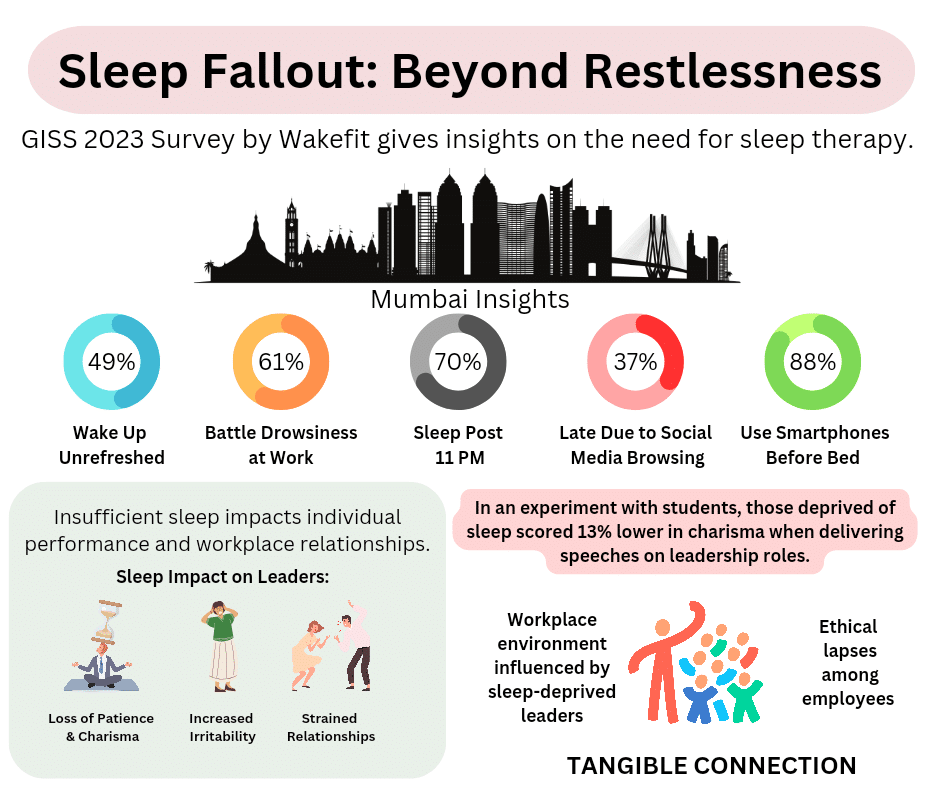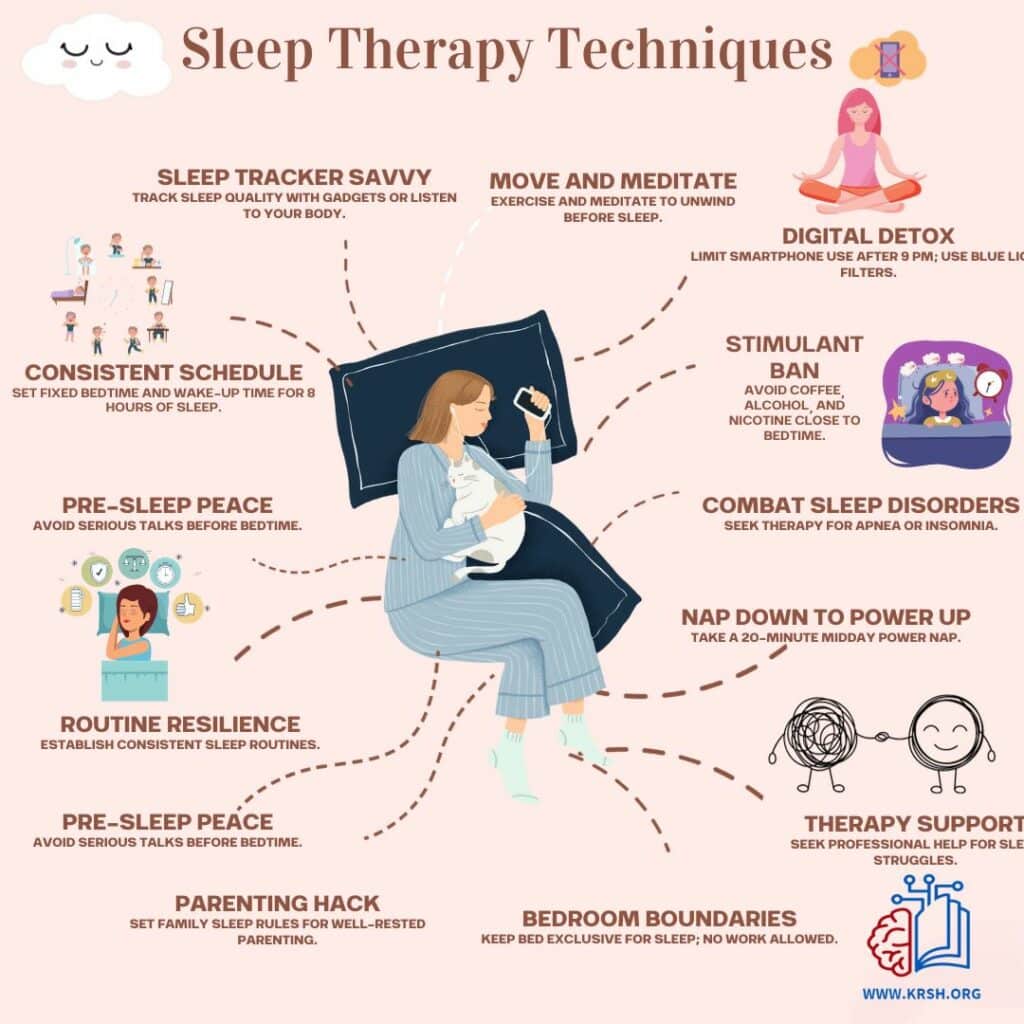The need for sleep therapy is reflected in recent surveys. An alarming 49% wakeup unrefreshed and 61% battle drowsiness at work in cities like Mumbai.
A sleep therapy does not necessarily needs compromising important work or missing on life. Even the busiest working parents can prioritize sleep with evidence-based tips. Recognizing and addressing sleep issues emerges as a strategic investment for individual well-being and overall productivity in the bustling landscape of modern India.
Self-help is great; but the help from a professional can shorten the journey to fulfilling sleep. Personalized assessment and targeted interventions helps you understand the root causes and discover tailored solutions.
Introducing the Sleep Problem
GISS 2023 Survey

A survey done in 2023 by Wakefit gives insights on the need for sleep therapy. Take the metro city of Mumbai for example; 49% respondents did not feel refreshed when waking up and 61% delt drowsy at work. 70% went to bed very late post 11pm and 37% were late because browsing social media on mobile phones. A massive 88% used smartphones just before going to bed.
Spreading Damage
Studies reveal that insufficient sleep doesn’t just impact individual performance—it seeps into the fabric of workplace relationships. When leaders show up unrested, they are more likely to lose patience, act abusively, and be perceived as less charismatic. Sleep-deprived leaders tend to be more impatient, irritable, and antagonistic, leading to strained relationships with their team. Shockingly, this negative dynamic persists over time, with leaders often unaware of the damage their fatigue inflicts.
Impact on Inspiration and Motivation
Effective leadership goes hand in hand with the ability to inspire and motivate. However, when leaders are sleep-deprived, this ability takes a hit. In an experiment with students, those deprived of sleep scored 13% lower in charisma when delivering speeches on leadership roles. Positive emotion, a key component of charisma, diminishes when leaders lack sufficient sleep, affecting the overall engagement and motivation of their subordinates.
Ethical Dilemmas
Perhaps one of the most alarming findings is the link between leaders’ devaluation of sleep and ethical behavior. Leaders who consistently downplay the importance of rest rate their subordinates as less likely to do the right thing. This isn’t merely a matter of perception; there’s a tangible connection between the workplace environment influenced by sleep-deprived leaders and ethical lapses among employees.
Boosting Energy Level with Sleep Therapy
A sleep therapy does not necessarily needs compromising important work. To illustrate this fact, we start with the most difficult case of working parents. Consequences are evidently dangerous both at home and work from sleep deprivation.
Sleep Therapy for Working Parents
In a fast-paced environment, working parents often sacrifice sleep. However, the consequences, both at home and work, highlight the importance of prioritizing sleep. Here are some evidence-based tips for working parents to establish good sleep practices:
- Make Sleep a Priority: Recognize the value of adequate sleep in boosting productivity and well-being. Establish a bedtime routine for the whole family, creating a conducive environment for winding down.
- Consistent Sleep Routine: Maintain a consistent sleep routine for yourself and your children. Consistency regulates the release of melatonin, promoting better sleep quality.
- Limit Exposure to Blue Light: Blue light from screens can disrupt sleep. Use blue-light filters or wear blue-light blocking glasses in the evening. Conversely, exposure to bright blue light in the morning can help set your circadian rhythm.
- Screen-Free Bedroom: Reserve the bedroom for sleep, keeping screens out to promote relaxation before bedtime.
- Quit Before the Damage: Avoid working late into the night. Stick to your bedtime to ensure efficiency and minimize mistakes.
- Manage Stress about Sleep: Acknowledge that occasional poor sleep is normal. Instead of worrying, focus on relaxation techniques to destress before bedtime.
- Timing of Serious Conversations: Avoid discussing serious matters right before bed. Save important conversations for times when both parties are awake and alert.
- Give the Benefit of the Doubt: Understand that others may also be tired. Give your family and colleagues the benefit of the doubt, assuming lapses are due to fatigue rather than lack of interest or neglect.
- Efficient Collaboration: Work together efficiently to reduce decision fatigue and inefficiency. Explicitly discuss and delegate household and childcare duties, leveraging shared tools for better coordination.
- Buying Time: If affordable, delegate tasks like housecleaning to buy time for adequate sleep.
- Flextime: Explore the possibility of flexible work schedules, allowing you to shape your work around family needs and reduce stress.
More Techniques for Sleep Therapy
Consistent Sleep Schedule

One of the often overlooked yet effective solutions for improving sleep quality is maintaining a consistent bedtime and wake-up schedule. Many leaders underestimate the impact of a regular sleep routine on overall well-being. By adhering to a set schedule, you signal your body to prepare for rest, creating a conducive environment for reenergizing sleep.
Substance Timing
Leaders, especially in demanding roles, should pay attention to the timing of substance intake. Avoiding caffeine within seven hours of bedtime, refraining from alcohol within three hours, and steering clear of nicotine within three to four hours can significantly contribute to better sleep. Leaders must recognize the importance of mindful substance consumption for quality sleep.
Exercise and Relaxation
Regular exercise is a powerful tool for enhancing sleep quality, but timing matters. Engaging in physical activity earlier in the day rather than right before bedtime contributes to better sleep. Additionally, incorporating relaxation and mindfulness meditation exercises can lower anxiety levels, facilitating a smoother transition into restful sleep.
Smartphones and Melatonin
Leaders often underestimate the impact of smartphone usage on sleep. The blue light emitted by screens suppresses melatonin production, a key biochemical involved in falling asleep. Encouraging leaders to alter smartphone behavior, such as avoiding usage after 9 pm or using blue light-filtering glasses, can significantly improve sleep quality and work engagement.
Sleep Tracking
Savvy leaders are increasingly turning to sleep tracking as a valuable tool. While not all trackers are equally accurate, you can monitor sleep quality from your body’s response. If you wakeup in morning energized to jump out of bed, you had sufficient sleep. If you drag yourself out of bed with a heavy head, your sleep has not been sufficient. Understanding one’s sleep patterns, identifying periods of wakefulness, and making informed adjustments can lead to more sustained and restorative sleep.
Addressing Sleep Disorders
Leaders often overlook the possibility of underlying sleep disorders. Conditions like insomnia and sleep apnea can significantly impact well-being and productivity. Leaders should be encouraged to seek diagnosis and treatment with sleep therapy from a professional. Taking help from psychotherapists at Krsh Welfare Foundation can lead to improved sleep, mood, and job satisfaction.
Embracing Naps
Napping is a powerful yet often neglected tool for enhancing cognitive processing, reducing errors, and increasing stamina. Some progressive companies, including Google and Zappos, recognize the benefits of naps and provide dedicated spaces for employees. Leaders should encourage a positive view of napping, emphasizing its potential to boost overall work effectiveness.
Learning from Pro-Sleep CEOs
Highlighting successful CEOs who prioritize sleep, such as Ryan Holmes of Hootsuite and Jeff Bezos of Amazon, serves as inspiration. Their testimonials emphasize the importance of adequate sleep for optimal decision-making and leadership effectiveness.
Strategic Task Engagement
Understanding that sleep deprivation is most harmful to novel tasks, prioritize your workload accordingly. Save high-consequence tasks for well-rested moments and consider delegating tasks that are vulnerable to the effects of sleep deprivation. Leverage decision support systems, seek advice from colleagues or experts, and explore crowdsourcing to compensate for cognitive limitations during sleep-deprived periods.
Building External Support Networks
When sleep-deprived, leaning on external support becomes crucial. Delegate tasks, seek advice, and consider using decision support systems. Crowdsourcing opinions or conducting informal audits after completing tasks can catch mistakes early. By acknowledging the limitations of a sleepy mind, you open avenues for external support to enhance overall effectiveness.
The Role of a Professional in Sleep Therapy
Self-help is great; but the help from a professional can shorten the journey to recovery. Therapists at Krsh Welfare Foundation provide personalized assessment and targeted interventions. It helps you understand the root causes of their sleep difficulties and develop effective coping strategies. Sleep is a cornerstone of mental health, and with the support of a qualified therapist it leads to enhanced psychological resilience.
Specifically, the following signs warn the necessity of immediate psychotherapy intervention:
- Impact on Daily Functioning: When sleep challenges significantly impact your daily functioning, including work performance, relationships, and overall quality of life, it’s time to consult a professional.
- Persistent Anxiety or Depression: If sleep disturbances are accompanied by persistent feelings of anxiety or depression, seeking the help of a therapist becomes crucial.
- Chronic Insomnia: If you consistently struggle to fall asleep or stay asleep, experiencing chronic insomnia, it’s a clear indication that professional intervention may be beneficial.
- Nightmares Frequent nightmares or night terrors can disrupt your sleep cycle, leading to heightened stress and anxiety. If these disturbances become a recurring pattern, seek help from a therapist.
- Excessive Daytime Sleepiness: Feeling excessively tired during the day, regardless of the amount of sleep you’ve had, may be a sign of an underlying sleep disorder.
- Sleepwalking or Sleep Talking: Engaging in activities like sleepwalking or sleep talking on a regular basis can indicate complex sleep disorders.